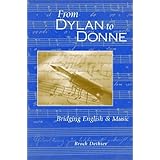
Average Reviews:

(More customer reviews)This book presents an innovative approach to teaching college students to examine and write about literature by analysing music. The author uses music in his classroom each day. English teachers don't need to have a background in music to use this method. I give the book a 4 only because it doesn't address pure third person analysis, instead it uses music to teach first person reader response. It's great if you are teaching literature. I teach analysis and research papers by looking at other disciplines besides literature, such as history, art, and mythology. I've wanted to bring in music, and this book has given me some excellent ideas. The downside of the book for me is its focus on first person voice, the reader's response, whereas, I teach all third person academic voice. I highly recommend this book, despite what I just said. I'm planning to give a copy to a colleague who teachers first person essay writing. It would be ideal for that type of course. It is powerful to bring in other disciplines into the Eng composition class room.
Click Here to see more reviews about: From Dylan to Donne: Bridging English and Music
Every life has a soundtrack, especially during high school and college, when we tend to live passionately and develop lifelong tastes. And everyone identifies with song lyrics that voice the love, angst, frustration, and anger we all feel at times. Brock Dethier takes advantage of students' identification with music and turns students' musical enthusiasms into material for learning and self-expression. Analyzing music and its effects makes students think. Besides, "it's the cheapest, easiest, most fun tool we can use in our classrooms," says Dethier-no small thing for educational institutions smarting from budget cuts.
As Dethier demonstrates, music provides an effective way to introduce and explain virtually everything about literature and composition-from the importance of leads to the concept of the unreliable narrator, from the value of radical revision to romantic irony. Both teachers and students benefit from listening to music with focused attention and from analyzing their reactions just as they analyze texts. Each chapter of this book presents a different way in which music can help students see, understand, appreciate, and analyze aspects of literature, composition, and our world. And each chapter provides teachers with specific suggestions for assignments, activities, and new approaches to difficult concepts.
It takes only a few minutes each day to make the musical connection. And it requires no experience as a musician or music critic to enjoy and use this book. Teachers just need to apply the book's insights to their own classes and to let students be the experts on the current music scene. For a fresh tack in English class, bridge English and music-wake up even the most bored and alienated students and make them eager to read, write, and rock.
Click here for more information about From Dylan to Donne: Bridging English and Music

0 comments:
Post a Comment